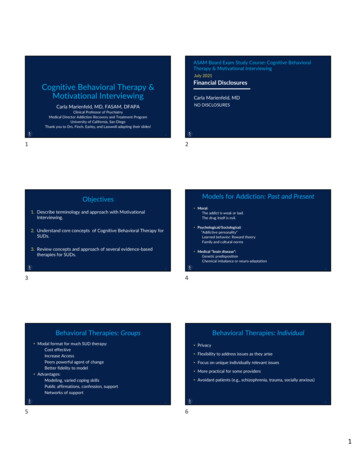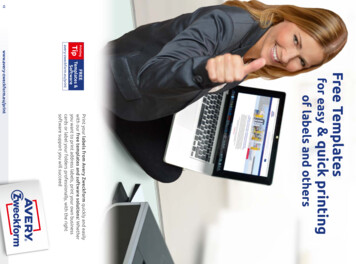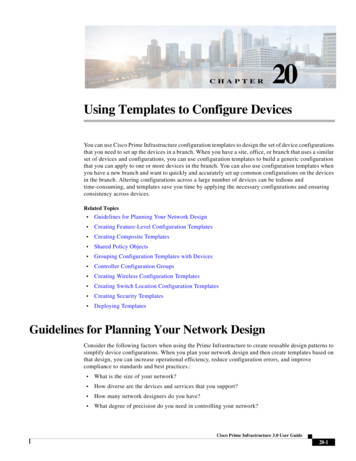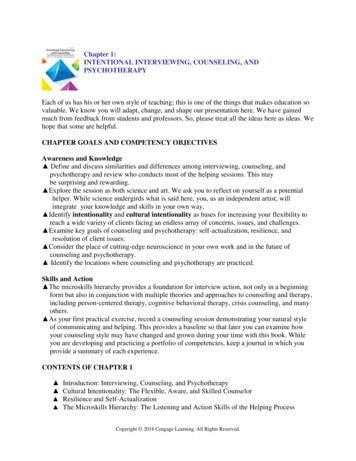
Transcription
RECRUIT TALENT IN TODAY’S MARKETBehavioral InterviewingQuestions and Templates
INTRODUCTIONGetting the right people in the door is crucial to yourcompany’s success. Finding the best fit for each role helpsyou hire employees who can drive innovation, productivity,customer satisfaction and profits.With the average cost of hiring at 4,000 per employee1,good hiring practices are essential to keeping recruitingcosts as low as possible. But the cost of a bad hire relatesto more than just replacement recruiting costs. A bad hirecan decrease productivity and customer service ratings,reduce employee morale, increase spending onunsuccessful initiatives, or — even worse — cause legalproblems. Bad hires can also adversely affect youremployer brand by spreading negative word of mouth.The interview process is where you have the most controlover who fills your employee roster. Behavioral-basedinterviewing is a technique used by many companiesto find out more about a candidate’s skills, attitudesand values. In this guide, we’ll show why behavioral-basedinterviewing is important, how to include it in yourinterview process, and how to craft your own questions.We also provide examples of questions for assessingcommon employee competencies.Source: 1 Talent Acquisition Factbook, Bersin by Deloitte, 20152 Behavioral Interviewing Questions and Templates Glassdoor, Inc. 2017
SECTION 1What Are BehavioralInterview Questions3 Behavioral Interviewing Questions and Templates Glassdoor, Inc. 2017
SECTION 1: What Are Behavioral Interview QuestionsBehavioral interview questions seek to predict a candidate’s suitability for a role basedon their behavior in past jobs. By finding out more about how a candidate behaved in similarsituations in the past, employers have a way to predict how they will perform in the future.Another common interview technique is called situational interviewing. Situational interviewquestions probe the candidate on how they would respond to a hypothetical scenario in thefuture. Because candidates don’t actually know how they would respond to a situation that mightnot happen, querying past behavior is thought to be a more reliable way to predict future behavior.Behavioral interview questions can helpyou uncover a candidate’s approach toproblems, conflict and stress, as well asilluminate values that are important toyour company’s culture.SITUATIONALINTERVIEW QUESTIONBEHAVIORALINTERVIEW QUESTIONExample: How would you approach a new product launch?Goal: To get a sense of how the candidate would approachthe task for your company.Example: Tell me about a successful product launch you worked on.Goal: To learn about how the candidate approached that taskat a past company.4 Behavioral Interviewing Questions and Templates Glassdoor, Inc. 2017
SECTION 1: What Are Behavioral Interview QuestionsThe Benefits of Asking Tough QuestionsOn Glassdoor, candidates can rate their interview process, providing clues to other candidateson what to expect when interviewing at a given company as well as giving constructivefeedback and praise to employers.In 2015, Glassdoor conducted a studycomparing the interview ratings tosatisfaction ratings of those who werehired. The study found:1Overall, a 10% more difficult job interviewprocess is associated with 2.6% higheremployee satisfaction later on.On a five-point scale, the optimal or “best”interview difficulty that leads to the highestemployee satisfaction is 4 out of 5, with5 being the most difficult.Candidates who go through a rigorous (but not too rigorous) interview process can perceivethat the company places a high value on finding employees who are a good match for boththe position and the company culture. Remember, difficult should mean rigorous, notdeflating or confusing.Candidates want to feel as though their experience and intelligence are valued. When combinedwith other interviewing techniques, behavioral-based questions can give candidates theimpression that your company is doing its best to find the right fit for the role rather than justchecking off a list of qualifications.Source: 1 Glassdoor Economic Research, October 20155 Behavioral Interviewing Questions and Templates Glassdoor, Inc. 2017
SECTION 2Oddball InterviewQuestionsAsking unorthodox interview questions is a way toilluminate a candidate’s experience and get a sense ofhow well he or she deals with unexpected situations.6 Behavioral Interviewing Questions and Templates Glassdoor, Inc. 2017
SECTION 2: Oddball Interview QuestionsOne type of atypical question is a situational question basedon an unlikely hypothetical event. These questions can be usedto gauge problem-solving ability, creativity and cultural fit.“If you were the CEO, what are the first three things you would check aboutthe business when you wake up?”Another type of oddball question asks the candidate to solvea problem that they are unlikely to encounter in real life.“How many square feet of pizza were sold in the last year?”Unconventional behavioral interview questions can be usedto learn about the candidate’s sense of humor or approachto making work enjoyable.“Tell me about the most fun job you ever had.”“Describe the most fun team project you worked on.”ACTION TIPAdding creative questions to your interview plan can showcandidates that you have a sense of humor about work. For bestresults, make sure to ask the same question to every candidateapplying for a given position.Review Glassdoor’s annual list of Top Oddball Questions.7 Behavioral Interviewing Questions and Templates Glassdoor, Inc. 2017
SECTION 3Mapping OutBehavioral InterviewQuestions8 Behavioral Interviewing Questions and Templates Glassdoor, Inc. 2017
SECTION 3: Mapping Out Behavioral Interview QuestionsBecause your time with each candidate is limited and youwant to find out the most relevant information about theirexperiences, it’s important to choose your behavioralinterview questions strategically.To focus your behavioral-based questions,think about them in these two ways:1Job FunctionLook at the job description and determine keycompetencies required to successfully performthe role. What knowledge, skills and abilities doesthe position require? Pick out 3–5 areas of focus.Competencies could include teamwork,problem-solving, customer service, communication,negotiation, leadership, initiative, adaptability, timemanagement, etc. See our Sample Question List.2Culture and ValuesBecause your company has a unique culture,it’s worthwhile to ask candidates behavioralquestions that will indicate if they could thrive inyour workplace.ACTION TIPLook at your values list and think about how they translate intobehavior. Then craft questions based on that behavior. See theHow to Craft Your Own Questions section following.9 Behavioral Interviewing Questions and Templates Glassdoor, Inc. 2017
SECTION 4Organizing theInterview Process10 Behavioral Interviewing Questions and Templates Glassdoor, Inc. 2017
SECTION 4: Organize the Interview ProcessYour interview process is part ofyour employer brand. Candidateswho research companies and jobs onGlassdoor have the opportunity to lookat interview reviews as they preparefor an interview with your company.78%More than 3 in 4 job seekers say thatratings and reviews from those on theinside are influential when decidingwhere to work.1The majority of job seekers read at least 6 reviewsbefore forming an opinion of a company.2Source: 1 Glassdoor Survey, September 2014; 2 Glassdoor U.S. Site Survey, January 201611 Behavioral Interviewing Questions and Templates Glassdoor, Inc. 2017
SECTION 4: Organize the Interview ProcessGetting organized about your interviewprocess will not only show candidates thatyou respect their time, it will make yourhiring decisions easier.Follow these tips as you incorporatebehavioral questions into your interviews.BE CONSISTENTPrepare a list of questions for each role. Ask all candidates the same questions, in thesame wording and the same order. This way, you’ll be comparing apples to apples when itcomes time to evaluate the candidates.DIVIDE AND CONQUERTo prevent the candidate from having to repeat answers to multiple interviewers,divide up questions based upon the interviewer’s area of focus or interaction with theparticular role.For example, an engineering candidate’s hiring manager could focus on problem-solvingbehavioral questions, while a project manager asks teamwork questions. Some companieschoose to assign cultural fit behavioral questions to HR or senior leaders.EVALUATE AND MEASUREWhenever possible, create a checklist and scoring system for each question or area offocus. Objective measures will help reduce any unconscious interviewer bias when itcomes time to make the hiring decision.12 Behavioral Interviewing Questions and Templates Glassdoor, Inc. 2017
SECTION 4: Organize the Interview ProcessHow to Create Your OwnBehavioral Interview QuestionsBehavioral-based interview questions rarely come in the form of questions.They are usually statements that guide candidates into sharing a situationfrom their past experience, and have two to three parts.1The OpeningFollowing are some common sentence openers:2“Tell me about a time when ”“Give me an example of ”“Describe a situation when.”“Walk me through ”The Situation or ProblemThe second part of the behavioral question suggests thetype of situation or problem the interviewer would like tofind out more about.For example, if a cultural value is “resourcefulness,” youcould say, “Describe a project you had to complete with verylimited resources.”3Adding SpecificsWhile many behavioral questions stop with only two parts,adding a qualifier allows you to find out more specificinformation relating to the candidate’s role.For example, if you want to know more about how a candidatedeals with conflict, you could ask, “Tell me about a time you hada conflict at work,” and get a wide array of answers. By addinga qualifier, you can focus the candidate’s answer: “Tell me abouta conflict you had with a customer / a manager / a colleague / anemployee.” Each of these options will lead the candidate downa different path, giving you the information you need that ismost appropriate to the role and your objective.13 Behavioral Interviewing Questions and Templates Glassdoor, Inc. 2017
SECTION 4: Organize the Interview ProcessHow to ProbeCandidates may or may not be trained in the commonlyused STAR (Situation, Task, Action, Result) methodof sharing their experience. But you can leverage thispopular method as a guide when interviewing candidateswho give answers that may seem too short or incomplete.As you consider a candidate’s answer, think about whatother information you would like to get a completepicture of how they approached the situation.Following are some examples of probing questions relating to STAR:SITUATIONWhat was the business problem or goal? Who was involved? Whatwere the budgetary considerations? What were the time constraints?TASKWhat did you hope to achieve? How did you come to that conclusion?Who did you consult? What information did you review to come tothat conclusion?ACTIONWhat did you do? What tools or resources did you use? Who didyou work with? What skills or experience did you draw upon?What obstacles did you encounter?RESULTWhat were the business results? What positive feedback did youreceive? What did you learn from the experience?14 Behavioral Interviewing Questions and Templates Glassdoor, Inc. 2017
SECTION 5Sample BehavioralInterview Questions15 Behavioral Interviewing Questions and Templates Glassdoor, Inc. 2017
SECTION 5: Sample Behavioral Interview QuestionsPROBLEM-SOLVING Tell me about a time when you had limited resources and were able to bring aproject to the finish line. Describe the most challenging work problem you faced in your last job. Walk me through a scenario of a process you invented or improved.TEAMWORK Tell me about a time when you had to adjust to a colleague’s working style inorder to complete a project successfully. Describe a situation when working with others produced more successful resultsthan if you had completed the project on your own. Tell me about a time when you were in competition with a co-worker. Recount a time when you worked with a colleague who was not doing their shareof the work. How did you handle it?CUSTOMER SERVICE Describe a situation where you’ve had to deliver bad news to a customer. Tell me about a time when you’ve resolved a problem for a disgruntled customer. Tell me about a time when you went out of your way to satisfy a customer. Whatwas the outcome?COMMUNICATION SKILLS Explain a time when you’ve had to deliver tough feedback to a colleague. Tell me about how you delivered project results to your manager. Tell me about a time when you had to get someone else to see things your way. Describe a time when you resolved a conflict with a colleague in your past role. Name a time you had to convince someone to do something they did not want to do.16 Behavioral Interviewing Questions and Templates Glassdoor, Inc. 2017
SECTION 5: Sample Behavioral Interview QuestionsPROJECT OR TIME MANAGEMENT Describe a time when you had to delegate work to others. Explain how you kept your work organized in your last role. Tell me about a time when you had multiple competingdeadlines and how you managed them.ADAPTABILITY Describe a time when you had to learn a new process or skill. Tell me about a time when you had to pivot away from a currentproject to address a “firedrill.” Tell me about a time when you dealt with ambiguity.WORKING UNDER PRESSURE/STRESS MANAGEMENT Tell me about a stressful situation and how you dealt with it. What did you do in your last role when your workload was enormous?INITIATIVE Tell me how you set goals and monitored progress in your last position. What did you do in your last role if you thought that you might fall short of hitting a goal? Tell me about a time when you were given little direction on a project and how you were able to complete it? Describe a situation in which you exceeded requirements.LEADERSHIP Tell me about a time you were leading a group, were assigned a goal, and did not reach it. Describe a time when you had to train someone. Tell me about a time you had a poorly performing team member.17 Behavioral Interviewing Questions and Templates Glassdoor, Inc. 2017
SUMMARYBy conducting thorough, behavioral-basedinterviews that go deeper than simply checkingoff relevant skills, you can make an enormousimpact on the success of your team and theoverall advancement of your business goals.Finding candidates who have the right skills andwho are also great culture fits with the abilityto weather adversity, manage stress, deal withambiguity, work constructively as a team, anddemonstrate resourcefulness will serve youwell in both the short and long term.It takes a little planning ahead — choosing whatinterview format you’ll use, what questions toask, and who will ask them — but the payoff ishigh. Finding the right fit for each role willdrive innovation, productivity, customersatisfaction and profits.18 Behavioral Interviewing Questions and Templates Glassdoor, Inc. 2017
About GlassdoorWith millions of company reviews, salary reports, interview reviews and benefitsreviews on more than 640,0001 companies worldwide, Glassdoor is a trusted andtransparent place for today’s candidates to search for jobs and research companies.Glassdoor helps employers across all industries and sizes advertise their jobs andpromote their employer brands to a well-researched, highly selective candidatepool. By advertising jobs via mobile devices, email alerts and throughout Glassdoor,employers influence candidates at the moment they’re searching jobs and makingdecisions. This results in more-informed candidates that require 50% fewerresumes to find a quality hire at a fraction of the cost of traditional job boards.For more tips on interviewing:subscribe to our blogTo get involved in the conversation on Glassdoor and start managing and promoting your employer brand,email employers@glassdoor.com, call (415) 339-9105 or visit www.glassdoor.com/employers.For the latest in recruitment marketing tips, best practices and case studies, follow us on Twitter: @GDforEmployers.GlassdoorInterviewingInternal Data, December2016; Asandmeasuredby application-to-hire ratio compared to other job sites based on a study of 2015 hiring data for 30 million applications19Sources: BehavioralQuestionsTemplates12 Glassdoor, Inc. 2017
5 Behavioral Interviewing Questions and Templates Glassdoor, Inc. 2017 In 2015, Glassdoor conducted a study comparing the interview ratings to satisfaction ratings of those who were hired. The study found:1 Overall, a 10% more difficult job interview process is associated with 2.6% higher employee satisfaction later on. On a five-point scale, the optimal or "best"










